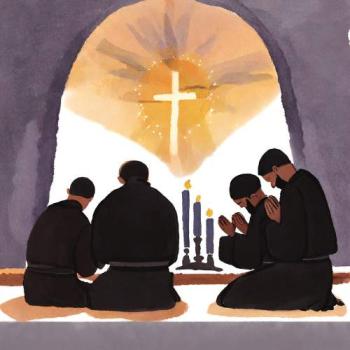After the Romans conquered an area, they turned it into a province. They set up a region within which they administered their government, often through locals. "Provincials" were those who came from these conquered, outlying areas. Because they were conquered by the Romans and because Rome, by conquering everyone, became the center of culture and power, to be identified as from the provinces was to be considered less-cultured, less-informed, with a more narrow understanding of things. We still use the word provincial to describe someone of local or restricted interests and outlooks, someone not connected to the rulers, and no one wants to be provincial.
Provincialism comes in at least two modes. The one we most often think of is the narrow-minded or perhaps merely naïve country-bumpkin. The "Book of Mormon" musical appears to portray both Mormons and Ugandans as this sort of provincial: backward and uninformed but ultimately loveable, laughable in the way that children can be laughable.
As with all stereotypes, this view has some basis in fact. Mormons can indeed be provincial in the ways that others lampoon. The LDS Church sends male missionaries out at the age of 19, asking them to teach people about religion when they themselves know little more than the bare basics. It isn't surprising when people find them uninformed. As Mormons are fond of saying, "The LDS Church must be true. If it weren't the missionaries would have destroyed it long ago."
Many learn a great deal as missionaries. After their missionary service, many continue to learn not only about their own beliefs, but about the beliefs of others. But sometimes what Mormons know about their religion or that of others doesn't move far beyond what they learned as missionaries. Sometimes we represent ourselves well in our relations with others; sometimes we don't.
American Mormons tend to be politically conservative (though, since most Mormons now live outside the U.S., that may not be true of Mormons in general). Utah County, just south of Salt Lake City, Utah, is among the "reddest" places in the U.S. Living there, I can verify that there are Democrats in the county, but not enough to take us off of the endangered species list. With that background, Mormons moving from Utah County to another part of the U.S. or the world may come with assumptions about politics that they mistakenly believe to be nearly universal. Some learn; some don't.
Even Mormons who aren't politically conservative are usually socially conservative: most of the men shave; we dress up for church meetings, and we go often; though of course we have divorced and other single-parent families, we tend to look a lot like Ozzie and Harriet and the kids. In the U.S., most of us are white, though the Latino percentage is growing rapidly. Often surrounded by people who are like ourselves, we have been known to forget that we are not the norm. Sometimes we say things that a little reflection would remind us are dumb or offensive. Some learn; some don't.
We may not be the rubes portrayed by Matt Stone and Trey Parker, but there is enough truth in those kinds of portrayals to make us uncomfortable. We can be provincial.
A second kind of provincialism is that of intellectuals. Most who are religious and interested in intellectual things try hard not to be from the provinces. It is important to us that others know that we are as well-informed and cultured as they. Even if we aren't concerned about what the Romans think of us as individuals, we don't want them thinking that to be religious is to be ignorant. Sometimes, however, we try entirely too hard, sometimes so hard that we prove that we are provincial. After all, Romans don't have to provide evidence that they're not provincial, only provincials do.
Provincialism of either kind often takes the form of an unreasonable reliance on authority. It's easy to recognize it in the first kind, but perhaps not as obvious in the second. There, rather than believing that thinking about a question means stringing together sufficient quotations from General Authorities, we let the Romans tell us what to think. Lacking confidence in our own thinking and afraid of being provincial, we appeal to the Romans. In both cases, however, we are so afraid of having the "wrong" opinion that we get all of our opinions from someone else.
The appeal to authority isn't the bugaboo that modern thought has made of it. Hans-Georg Gadamer made its case more than fifty years ago in Truth and Method. Because we are historical, contingent beings, we must rely on the appeal. Doing so is part of any intellectual work. No one has the time to investigate everything and, more importantly, everyone must begin reasoning and thinking from some basis that was not given by reason alone. But of course not every appeal to authority is justifiable. The appeal to authority can become the easy answer to every question, including questions without easy answers.





